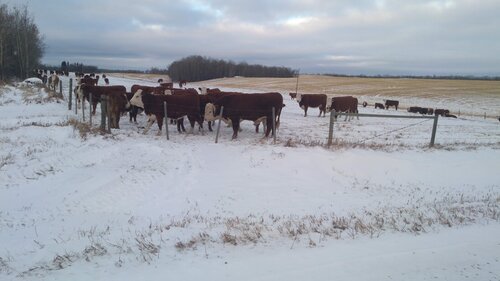Stock Growers Call For Governments To Investigate Beef And Cattle Pricing
By Robert Thomas
With the current grocery store prices for beef at an all time high and ranchers and farmers squeezed financially the Saskatchewan Stock Growers Association (SSGA) has called on both the provincial and federal governments to conduct a pricing investigation in cattle and beef pricing markets.
"Though each industry sector has its own frustrations, we agree that price transparency and discovery, packer capacity and pricing spread are our biggest joint concerns," SSGA President Garner Deobald said in a statement.
Deobald said staffing changes at slaughter and processing facilities is poised to do further damage to the rancher/producer and stockyard level because it has reduced demand for cattle and have the potential of keeping market cattle prices low at a time where costs are high and the access to feed is challenging for many.
Market-wise the drought has had a severe impact on the ability of producers to break even let alone turn a profit.
Cattle waiting to be fed in early winter a few years back - MJ Independent file photo
“The severe drought across the Canadian Prairies has greatly impacted the beef industry. Grass continues to be scarce in several regions, and feed grain and forage prices have doubled from two years ago. The situation has caused a wider availability for cattle ready for slaughter with higher placements in feedlots,” said in their release.
"Many producers and feedlots are feeling challenged by increased costs due to inflation, fuel and record-high feed costs. Our members are sharing their frustrations with us. There is a disconnect between what producers are receiving for their animals and the high prices consumers are paying for beef products. Producers are feeling exploited," Deobald said.
The SSGA said that ranchers/producers are not reaping the benefits of consumer willingness to pay higher beef prices. The packers/processors and retailers are they claim.
"Though packer margins have tightened, both packers and retailers are reporting strong profits as consumer demand and willingness to pay higher prices for beef products remains strong. Producers are tired of working so hard for little or no return on investment," Deobald said.
According to Statistics Canada the price of meat on average rose 14.1 percent from April 2021 to April 2022 while beef rose a whopping 17 percent over the same time period in Saskatchewan.
At the same time cattle prices to ranchers/producers and feedlot operators remained stagnant.
The imbalance pointed out by the SSGA is seemingly backed up by recent financial statements by JBS Foods.
The food processing giant’s Q1 2022 (January 1st - March 30th) show a 21 percent increase in consolidated net revenue versus the same quarter in 2021 for its JBS Beef North America (which includes Canada) division.
JBS owns a large facility in Brooks, Alberta and at one time owned the cow slaughter plant in Moose Jaw that is now being converted into a sow slaughter and processing plant by Donald’s Fine Foods.
SOURCE - JBS Foods Q1 2022 report to investors
In their release the SSGA said that during the COVID - 19 pandemic the packers ran night shifts to help open the bottlenecks caused with worker illness and safety concerns. The subsequent cutting of the night shifts has left another bottleneck in the system with ranchers/producers and feedlot owners squeezed.
"Limiting supply to drive up prices is changing the face of Canadian agriculture. The packers and retailers know there's no one else to take their place or profits, so they have control right now," Deobald said explaining the present marketplace.
The SSGA’s call for an investigation coincides with similar calls from critics south of the border. Calls based upon consolidation in the industry leaving four main players who are controlling prices to ranchers/producers and feedlots as well as on the grocery store shelves.
The Biden Administration has taken note of massive profits in a meat industry dominated by four key food processors - JBS, Tyson, Marfrig and Seaboard - have seen massive profit growth since the start of the COVID - 19 Pandemic.
“Here is the bottom line: the meat price increases we are seeing are not just the natural consequences of supply and demand in a free market—they are also the result of corporate decisions to take advantage of their market power in an uncompetitive market, to the detriment of consumers, farmers and ranchers, and our economy. ”
Read the entire Whitehouse blog post by clicking here.
Without changes to the system the SSGA said some of its members could leave the industry which would have wide ranging results beyond beef supply as grass land used for cattle could be converted into grain land.
Deobald said the bottom line is to see consumers have access to beef at fair prices and ranchers/producers and feedlot operators be able to earn a fair return (and a living) for their cattle.
"Our goal is to produce safe and nutritious beef for Canadians while maintaining our ranching livelihoods," he said.
"If producers continue to operate at a loss, many will go out of business, which could drive Canada to rely on imported meat. We believe a pricing investigation is the best way to ensure all livestock value chain members remain profitable and all Canadian consumers have economic access to our products. We look forward to working with all stakeholders to make this happen."


